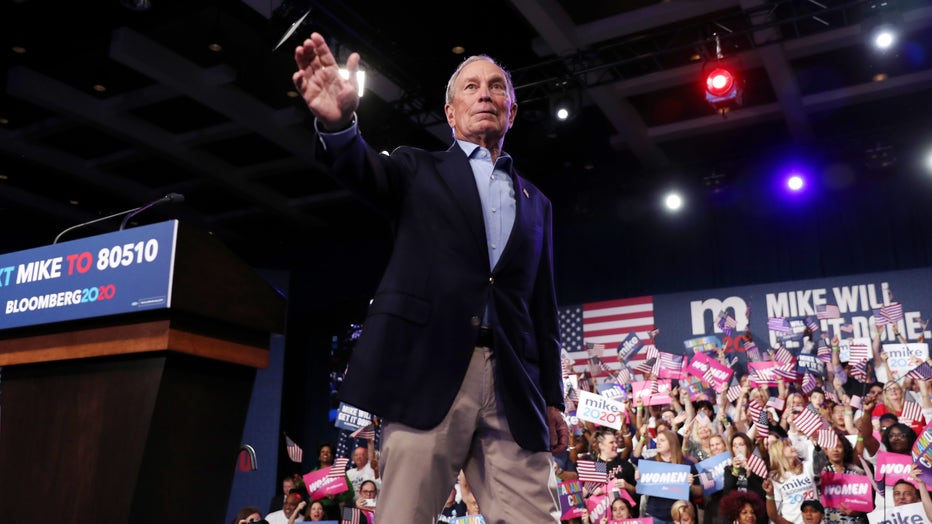Bloomberg to reassess after disappointing Super Tuesday results, according to AP source
LOS ANGELES (AP) - Democratic presidential candidate Mike Bloomberg will reassess on Wednesday whether he should stay in the race after getting disappointing results in Super Tuesday primaries despite spending more than a half billion dollars on his campaign.
A person close to the Bloomberg campaign confirmed the deliberations. The person wasn't authorized to discuss the matter by name and requested anonymity.
RELATED: Super Tuesday marks first major security test of 2020
Bloomberg, a billionaire businessman and former New York mayor, spent sums never before seen in political campaign history since entering the race in November. Millions of dollars went toward states like Virginia, North Carolina and Tennessee — all three of which former Vice President Joe Biden won handily on Tuesday, riding a wave after his decisive victory in South Carolina.
Bloomberg, the world’s ninth wealthiest man, has a $61 billion net worth.
The AP has allocated 18 delegates to Bloomberg: Five from the territory of American Samoa; one each in Texas and North Carolina; four in Tennessee; and seven in Colorado.
Kevin Sheekey, Bloomberg's campaign manager, said the campaign's "number one priority remains defeating Donald Trump in November.”
Polls in California, the largest delegate prize of the primary contest and a state where Bloomberg spent at least $57 million, had not yet closed.
RELATED: Super Tuesday tally: Biden wins 8 states; Sanders takes 4, including California
The 14 states that voted Tuesday were the first in which Bloomberg's name appeared on the ballot, after he skipped the first four voting states. It's an unorthodox strategy that has never worked before, yet the scale of Bloomberg's spending was unprecedented.
“When you come in late to the game and you are someone who has a record, you can’t assume you can just wash that away with spending. You’re still gonna have to answer questions and you’re still gonna have to be vetted,” said Karen Finney, a Democratic strategist and former Hillary Clinton aide.
The money allowed Bloomberg to campaign in the Super Tuesday states in ways his opponents could only dream of. He was the only candidate on air in all 14 states, and had staff on the ground in every state, including some teams that campaign leadership said were bigger than any campaign had built for a prior election.

FILE - Democratic presidential candidate former New York City mayor Mike Bloomberg waves to his supporters at his Super Tuesday night event on March 03, 2020 in West Palm Beach, Florida. (Photo by Joe Raedle/Getty Images)
According to TV ad spending data obtained by The Associated Press, Bloomberg dropped nearly $180 million on television advertising alone in the 14 Super Tuesday states as of this past weekend.
In states like Virginia and Alabama, Bloomberg’s massive ad spending did little to stop Biden from seizing victory. Bloomberg had spent more than $12 million in Virginia, with 99 delegates at stake, since entering the race. In Alabama, Bloomberg spent more than $6 million on television advertising, with more than $1 million in the 10 days leading up to the election.
He's also been spending tens of millions on digital advertising, all guided by a secretive digital firm called Hawkfish that Bloomberg himself founded last spring that provides the campaign with digital ad services, including “content creation, ad placement and analytics,” according to a campaign spokesperson.
RELATED: Super Tuesday: Amid coronavirus fears, some states report no-show poll workers
But the onslaught of ads seemed unable to make up for the damage inflicted by his opponents — and his own poor performance — during his first primary debate, in Las Vegas last month. There, nearly all his opponents hammered him over allegations he made sexist and crude comments to former employees and nondisclosure agreements that women who worked for his company had signed preventing them from speaking out.
Campaigning in Florida Tuesday morning, Bloomberg insisted he had no plans to drop out regardless of his showing in the states voting that day — and suggested that he wants to take his campaign all the way to the convention, regardless of how he does Tuesday night.
“I’m in it to win,” he told reporters, adding that a convention fight is “the only way I can win.”

